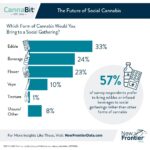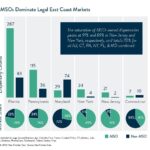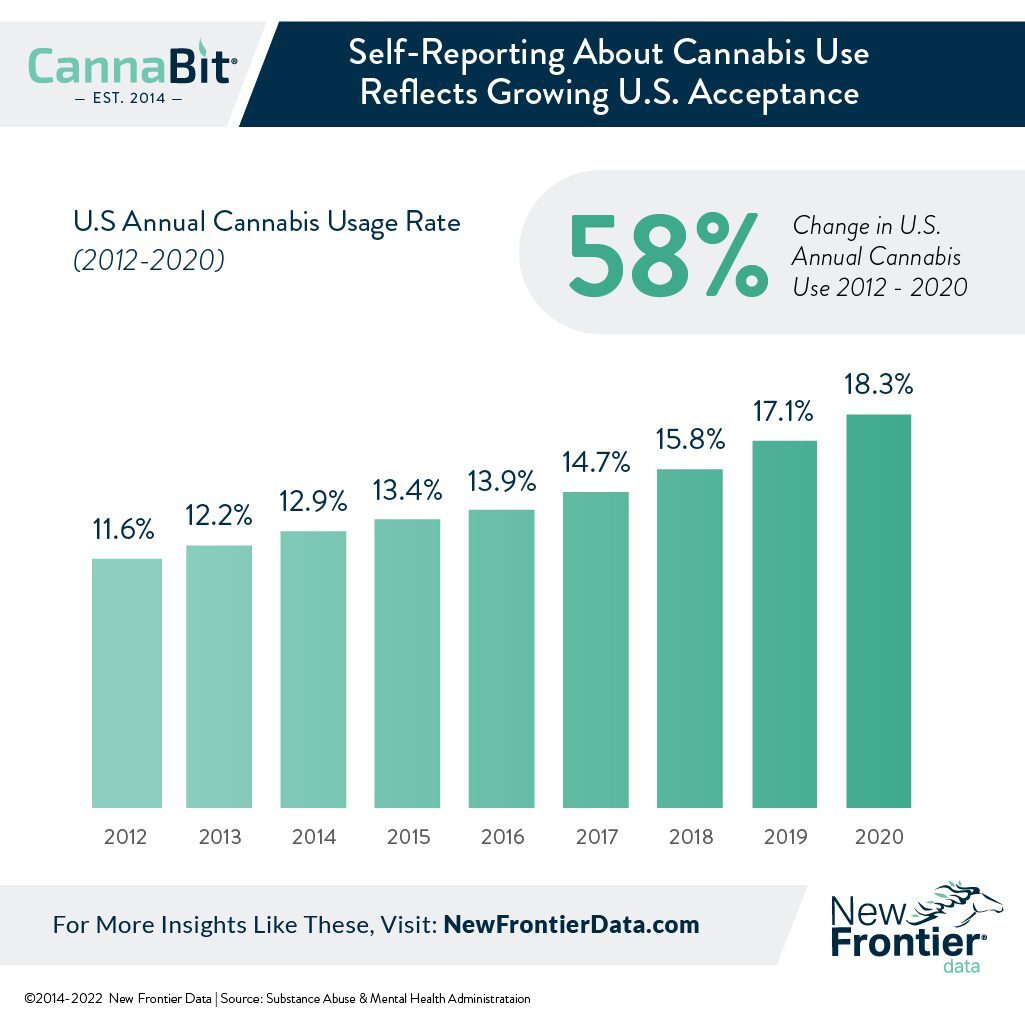Normalization of Cannabis Yields Accuracy in Self-Reporting

An Industry in ‘Bloom’: New Frontier Data Analysts Discuss What’s Coming in 2022
February 1, 2022
MSOs Establishing Themselves With Strength in Legal Cannabis Markets
February 15, 2022By J.J. McCoy, Senior Managing Editor, New Frontier Data
New data reported by the Substance Abuse and Mental Health Services Administration (SAMHSA) reveals a continued dramatic rise in self-reported annual cannabis use in the United States. Since 2012, the national average overall saw an effective 58% increase, with 18% of adult Americans now reporting having consumed cannabis within the previous year.
“Now nearly 1/5 of Americans report using cannabis at least once a year,” noted John Kagia, New Frontier Data’s Chief Knowledge Officer. “The national trend will be sustained as prohibitions on cannabis ease, and new products provide consumers more and novel ways to integrate cannabis into their lifestyles.” He added, as example, how older Americans as a demographic cohort have been increasingly more inclined to accept and use cannabis as a therapeutic option.
“American adults are not waiting for federal or even state governments to provide permission,” Kagia said, as demonstrated by adults crossing state lines for access to legal markets. “At this rate, there is far greater visibility of cannabis within social circles and contexts, with increased public acceptance of the medical and economic benefits of regulated cannabis. The public’s acceptance has far outpaced that of national and state government leaders.”
Last Wednesday, Mississippi became the latest state (39th overall, and third in the Deep South after Louisiana and Alabama) to legalize medical cannabis. The Magnolia State’s law took immediate effect, with dispensaries able to open before year’s end; specifically, the law calls for license applications to be accepted within 120 days (or 150 days in the case of dispensaries), with regulators required to resolve applications within 30 days.
According to the National Conference of State Legislatures, there are 37 states and four U.S. territories allowing cannabis for medical use. Now 18 states, two territories, and the District of Columbia (D.C.) allow adult-use cannabis (D.C. does not regulate adult-use sales).
Usage rates are up the most among traditionally conservative states’ markets, which nearly doubled their reported rates across eight years: Kansas topped the list (with a reported increase of 107%), followed by Oklahoma (99%), and Utah (90%).
In those conservative markets which have historically been strictest in their prohibition enforcement, consumers were understandably more reticent to speak about cannabis use. Oklahoma’s medical program exploded beyond expectations once that the state’s expansive medical market launched. Patient participation in Oklahoma’s program has been so strong that there are now more adults registered in Oklahoma’s medical cannabis program that there are self-reported consumers in the federal government’s polling in the state. Oklahoma is the first instance seen where a medical program has grown larger than the total number of estimated cannabis consumer in the state, suggesting that the under-reporting in the government survey, in the most conservative states, could be significant.
As Southern and Midwestern U.S. states liberalize their cannabis policies, self-reported usage rates are expected to rise as consumers come out of the proverbial closet to speak more freely about the role of cannabis in their lifestyles and communities.
“Research that relies on the self-reporting about an illegal or stigmatized activity is always difficult,” explained Amanda Reiman, New Frontier Data’s Vice President of Public Policy Research. “Even when answers are anonymous, people tend to respond in ways that protect their public image. As cannabis use becomes more normalized, we expect to see more people willing to admit to it. This can skew data that appear to show use rates increasing, but in actuality reflect a change in stigma or legal status.”
Even in traditionally more open markets, disparities have been notable. From 2012-2020, self-reported use increased 82% in Washington, 72% in Colorado, 63% in Oregon, and 62% in California, which suggests that it is more than just a story of consumers coming out of the shadows, but also that more adults are for their first times using cannabis.
One notable if underdiagnosed reason for the broadening diversity of cannabis consumers is the growing awareness that different cannabis products can be paired with specific experiences or desired outcomes. From exercise to relaxation, and sex and sleep, consumers are reporting that the right pairing of genetics and product forms can elevate a wide array of experiences. The idea of experience-based cannabis pairings, especially with noncombustible cannabis products, will be an important catalyst in challenging longstanding stereotypes of cannabis consumers, and lower barriers for the canna-curious to integrate cannabis into their lives in intentional and carefully considered ways.
For more comprehensive information and to keep track of further developments in the legalized U.S. and global cannabis markets, New Frontier Data offers its proprietary Equio® business intelligence platform.




